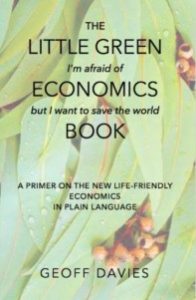A novel idea: harness the economy to good cause
Geoff Davies
The following has been extracted from Chapter One of Geoff Davies’ latest book The Little Green Economics Book.
The economy could be run in a dramatically different way, with more benefit to everyone and far less harm to many people and the planet. Whereas there are many critiques of current economic management, few seem to appreciate just how fundamentally misguided are the ideas on which it is based. Central economic ideas and practices are wrong, irrelevant or perverse in various combinations.
If we clarify our ideas of what an economy is and how it works then a far more positive prospect emerges. This short book is to alert people to this prospect, and to help them avoid being intimidated by the expert ‘econobabble’ and false authority of mainstream economists.
There are today many good people pursuing many causes and doing a lot of good for the world. They promote tolerance, reduce conflict, enshrine principles and help the needy. They defend environments and promote farming methods, products and life- styles that are healthy for people and the planet.
Yet we still seem to be going back- wards. The land and the planet are degrading at an alarming rate, politics just seems to get nastier, and intolerance and conflict continue. Part of the reason for this is that there are fearful people in influential roles who spread their loathing in their efforts to assuage their own fear. But a deeper reason is that our economic system promotes division, exploitation and insecurity. So long as that is true the fearful will find fertile ground for their alarmism and the good works will be trampled and subverted.

If it seems economists make no sense, you are right. That’s not just because economists speak a strange language that normal people can’t understand. It is also because their economic ideas are nonsense. Example one, the central theory of free markets is an irrelevant abstraction. Example two, the Federal Government creates money, it doesn’t borrow it, so the so-called budget deficit problem is a misunderstanding and a beat-up. Examples three to five, private banks are incentivised to maximise our debts, financial markets are far too big and have become parasitic, and the poorly-regulated financial sector destabilises the whole economy. Nor are these the only important problems – we’ll work our way through others in the following chapters.
The current regime has come to be called neoliberalism. It has also been called economic rationalism, market fundamentalism, Thatcherism (in the UK), and Reaganism (in the US) among other labels.
And how is it working, the economic management based on all the neo-liberal misconceptions and myths? Fantastic, we’re told ad nauseam.
Perhaps, on the other hand, you feel we’re not actually doing so well, what with the stagnation of wages, the astronomical price of housing, the cost of education not far behind, dramatically rising inequality and increasing dissension and conflict in our once easy-going, fair-go land of Oz.
Source: http://betternaturebooks.net.au/ index.php/my-books/little-green/






























